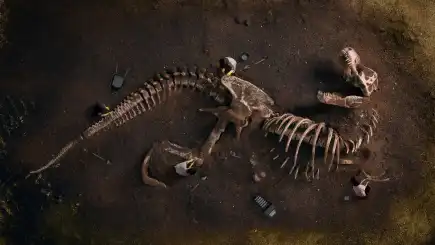Learn about dinosaurs with online courses and programs
What are dinosaurs?
Dinosaurs, remarkable reptiles, dominated Earth from the Late Triassic period, starting around 230 million years ago, until the end of the Cretaceous period, around 65 million years ago. While many associate dinosaurs with their enormous sizes, they varied greatly, ranging from small, bird-like creatures to massive herbivores and fearsome carnivores. Dinosaurs stood out because of their upright posture, their legs directly beneath their bodies, unlike the sprawling legs of modern reptiles like lizards. This posture enabled dinosaurs to move efficiently and likely played a part in their 160-million-year dominance.
An extinction event at the Cretaceous period's conclusion obliterated most dinosaur species. However, birds, descendants believed to have evolved from small, feathered theropod dinosaurs, carry their legacy. Dinosaurs captivate people globally, serving as subjects of both fascination and rigorous scientific study, shedding light on Earth's ancient history and life's evolution on our planet.

Browse online dinosaur courses New
Dinosaur course curriculum
Dinosaurs play a pivotal role in our natural history. By studying them, we can unearth secrets of Earth's ancient timeline and even gain insights into its potential future. Dinosaur bones offer a window not just into the life of these massive reptiles but also into the environment they inhabited. Through the fossil record, we piece together critical data on evolutionary trajectories.
Paleontology, the scientific study of dinosaurs, delves into various subjects. Beginners might explore foundational topics, such as fossilization principles and geology's intricacies. As they progress, they could delve deeper into the ecosystems in which these colossal beings thrived, alongside their detailed anatomy and physiology. More advanced courses might tackle the vast diversity among dinosaurs, their behaviors, and the complex ecology surrounding them.
edX offers online courses that allow learners to study a variety of topics including dinosaurs, archeology, and much more. Sign up for an accelerated boot camp, or enroll in a full degree program and start working toward a bachelor's degree, or (for more advanced learners) a master’s degree in a relevant subject. You can also explore executive education programs specifically designed for busy professionals.
Explore dinosaur jobs
Studying dinosaurs can open up a range of exciting career opportunities in various fields, not only in academia but also in industries related to science, education, and conservation. Some career paths include:
Paleontologist: Studies and researches fossils, including dinosaurs, to contribute to our understanding of prehistoric life. This role can involve fieldwork, laboratory work, and academic research.
Museum curator: Manages and curates fossil exhibits, conducts research, and educates the public about dinosaurs and other ancient life forms.
Science educator: Teaches paleontology or earth sciences at schools, colleges, or universities.
Science writer: Makes complex dinosaur research accessible to the public through books, documentaries, websites, or museum exhibits.
Fossil preparator: Prepares, cleans, and restores fossil specimens for research and exhibition in museums and research institutions.
Geologist: Specializes in the geological aspects of paleontology, helping to understand the context and dating of dinosaur fossils.
Environmental consultant: Assesses the environmental impact of projects, particularly in regions with significant fossil resources.
Paleoartist: Creates realistic reconstructions of dinosaurs and prehistoric landscapes for books, documentaries, and museum exhibits.
Conservationist: Helps protect and conserve modern-day species and ecosystems.
Are you ready to expand your knowledge about dinosaurs? Start with courses offered through edX.
Last updated
